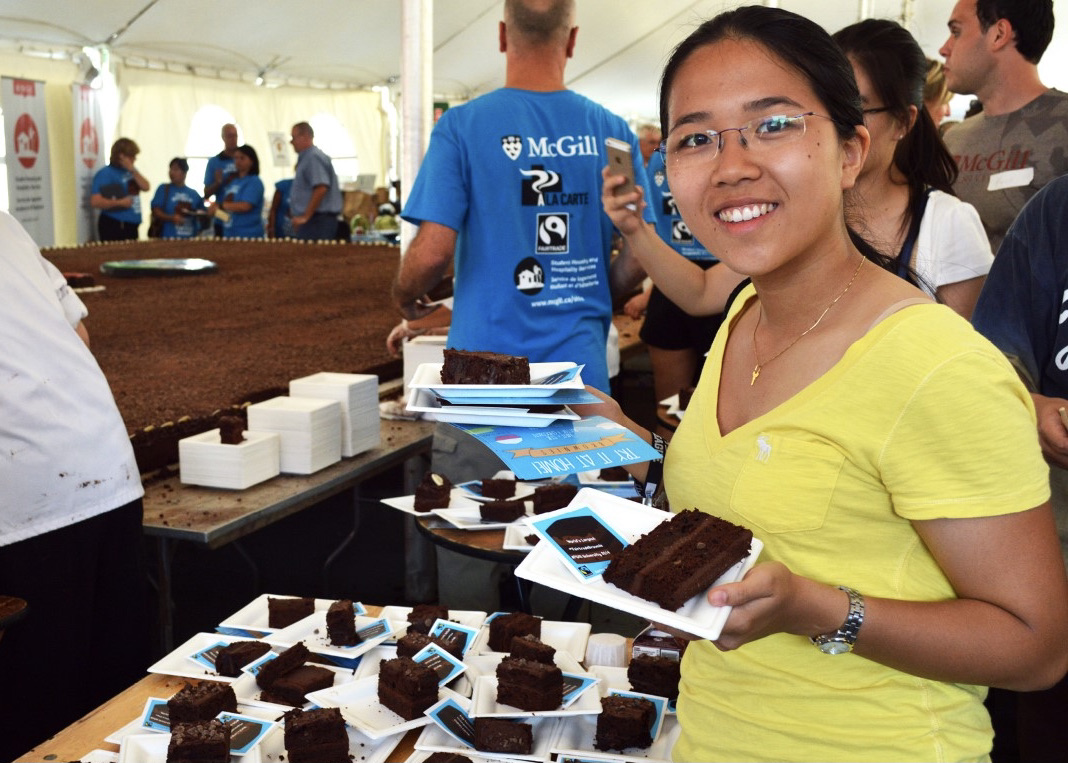
When buying a brownie at one of our many dining halls, or purchasing a shirt from Le James, comprehensive sustainable certifications may not be the first thing that comes to mind.
One of McGill’s lesser-known sustainability achievements is the University’s Fair Trade Campus Certification. Student Housing and Hospitality Services (SHHS), in partnership with the McGill Engineers Without Borders Group, initiated the certification in 2013 as a part of the campus-wide shift towards a more sustainable environment.
Thanks to a campus-wide collaboration involving staff, students, and faculty, McGill’s downtown campus achieved its first sustainable certification in 2013, followed by the Macdonald campus in 2019. McGill was the first University in Quebec to achieve such a designation.
As a part of Fair Trade Campus Week, taking place from Oct. 25 to 29, 2021, the Fair Trade core action team will be hosting events across campus to give the McGill community a taste of what it means to work and study on a certified campus. To learn more about this week’s activities, follow @mcgillfood, @nrheats and @carrefourmcgilleats.
“Sustainability is one of our guiding principles at Student Housing and Hospitality Services and we’re very proud of our Fair Trade Campus Certification,” said Shawn Casey, Manager of Contracted Food and Beverage Services. “It allows us to offer and promote Fair Trade products that encourages the community to support and contribute to the cause.”
The making of a fair campus
Fair Trade is an arrangement designed to help producers in growing countries achieve sustainable and equitable trade relationships and avoid being taken advantage of by large corporations that purchase goods to sell in other countries.
Certification is monitored by Fair Trade Canada, a national non-profit working to assess and improve the use of Fair Trade goods in businesses and institutions. This certification system is governed in part by global producers, ensuring that the policies in place will be meaningful to small farmers. Their model of trade ensures better prices, decent working conditions, no child labor, sound environmental practices, and strong business relationships. This empowers small-scale farmers to take control of their businesses and livelihoods.
“Fair Trade is an important aspect of sustainability because it sets strict standards for products across all three pillars of sustainability: social, economic, and environmental,” commented McGill Sustainability Officer Lauren Macdonald. “These standards ensure that farmers, workers, and artisans are treated fairly, guaranteed a minimum price, and that the land is harvested sustainably. Providing Fair Trade products on campus is important for achieving McGill’s sustainability objectives because it allows the McGill community to make mindful buying choices that can contribute to fighting inequality and environmental degradation.”
“If we want to incite the Montreal–or even the Canadian–society to shift to conscious consumption, we need to start at the university level first!” added Post-Graduate Students’ Society (PGSS) Environment Commissioner Charlotte Aubrac. “McGill is a place where future sustainability leaders are made. By reaching for the Fair Trade Certification, the University paints itself as a sustainability role model in the industry of higher education and makes its student population proud.”
The sweet side of sustainability
The largest aspect of Fair Trade on campus is the use of Fair Trade chocolate, cane sugar, and coffee in all dining services, as well as fair-trade textiles for clothing at Le James bookstore. In 2014, Dining Services broke the world record for the largest Fair Trade brownie.
This certification isn’t permanent; it requires active review and discussion every year, which is facilitated by the Office of Sustainability; a steering committee, composed of members of Student Housing and Hospitality Services, and student environment commissioners, ensures McGill maintains Fair Trade requirements. In addition to the steering committee, a core action team of student volunteers organize events and outreach initiatives.
Floor fellow and former Environment Residence Council Advisor Aliya Frendo is one of several student volunteers who coordinate Fair Trade on campus. “This group is a great way for me to learn about the ways in which major institutions on campus are becoming more sustainable and equitable, as well as connect with the people behind these changes so that we can work together to build the campus I want to see.”
